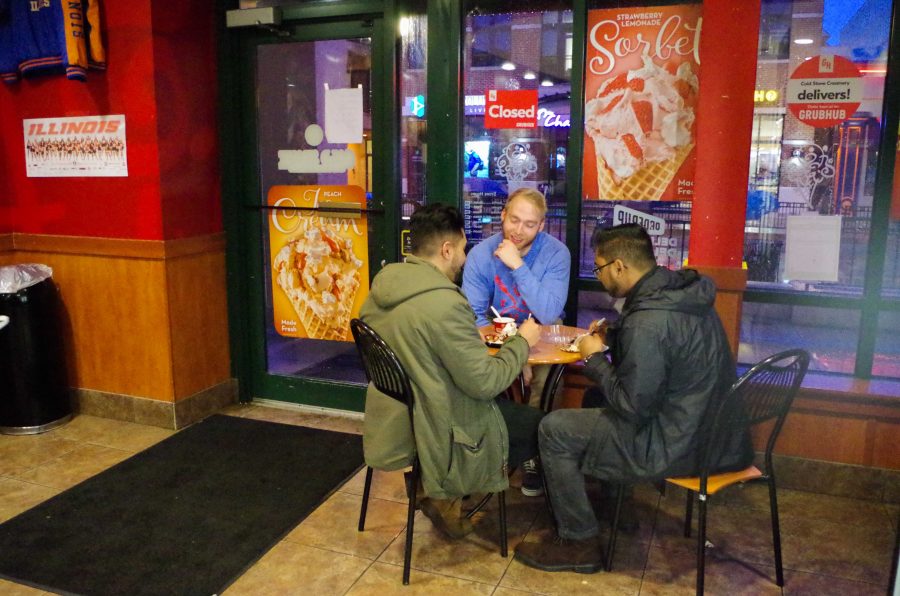Jewish community pushes for a more kosher campus
April 5, 2017

Over the past few years, the University has gradually improved its kosher food options. Recently, members of the Illini Hillel, a center for Jewish life on campus, have taken matters into their own hands and started a plan to encourage more restaurants and dining halls to make kosher food accessible for students.
Rebbetzin Ahava Schachter-Zarembski, Jewish educator at the Illini Hillel, said keeping kosher is a Jewish dietary code that is described in the Bible. It prohibits Jewish people from eating pork, mixing meat and dairy and requires a certain kind of slaughter method that’s more humane and moral.
Schachter-Zarembski and her husband, Rabbi Schlomo Schachter, both employees of the Illini Hillel, have put together an initiative to help the campus community become more kosher-friendly. This initiative is one of the first efforts to create a more kosher-friendly community outside of Chicago.
Get The Daily Illini in your inbox!
Schachter-Zarembski said that by the summer Cold Stone Creamery in Champaign and The Dancing Dog Eatery and Juicery in Urbana will receive their kosher certification from Vaad Hoeir of St. Louis.
“That is just stage one,” Schachter-Zarembski said. “Stage two is to create private space for students who observe the Sabbath, add more kosher restaurants and really get Chicago excited about this inclusive and diverse school that supports minorities and the Jewish community. Stage three is getting the word out that this is really a place of Jewish growth.”
Solomon Lowenstein, junior in ACES, has kept kosher on campus for the past four years he’s spent at the University.
“The hardest part about keeping kosher is that a lot of my friends aren’t kosher. So when we want to eat out, (our options) are very limited,” Lowenstein said.
For those who don’t eat kosher, Lowenstein shared his favorite kosher snack, which is Bissli, a potato chip or wheat snack that comes in several flavors. His favorite, in particular, is barbecue flavored.
Schachter-Zarembski said how supportive the organizations and mayor of Champaign have been trying to work toward a more kosher environment for students who observe this practice.
Schachter-Zarembski and Lowenstein both agree that Allen Hall, in particular, has been very understanding in an attempt to convert to a kosher dining plan, but other University dining halls could use more improvement.
“Allen Hall has kosher for dinner but no kosher for lunch. Ike, Bromley or Presby would be some great ones to start having kosher meals.” Lowenstein said. “For those who don’t live in the dining halls, another restaurant would be nice. Dining halls are the biggest target, though.”
Schachter-Zarembski explained how many students have trouble keeping a healthy diet here while keeping kosher. She explained that one of the goals she was aiming toward is converting more restaurants to kosher that use Grubhub so food can always be available.
“Many students don’t eat dinner because they have to eat across campus and they may have responsibilities on the other side of campus,” Schachter-Zarembski said.
Miriam Coven, senior in ACES, keeps kosher and said there aren’t many options, but that it becomes easier over time once you know where to go. Most people end up cooking for themselves. Coven said she has learned how to best survive on Starbucks — specifically the drinks.
Schachter-Zarembski describes how much she appreciates the community of people and places in which she is working. She finds the students to be extremely humbling through this whole process.
“The students are unbelievably strong. They are so dedicated to their culture, identity and improving their school from ethics they believe in,” Schachter-Zarembski said. “Even though we are in the middle of cornfields, the store owners and mayor have been so accepting. It has just been amazing and it makes me really proud.”
Schachter-Zarembski said her main goal is to create a place where students have the opportunity to be a part of their cultural identity and of the broader community as well.
“If this plan goes through,” Schachter-Zarembski said, “Champaign-Urbana will have the most kosher restaurants, besides Chicago, in Illinois.”







